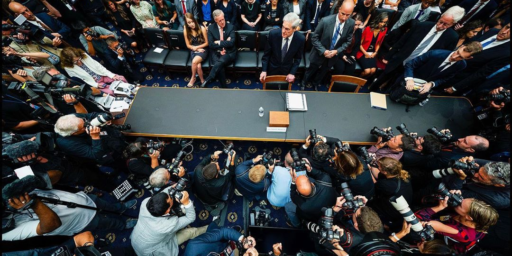Impeachment In The Wake Of The Mueller Hearing
The Mueller hearing has weakened the political argument for impeachment. Democrats need to proceed with caution, and concentrate on winning in 2020 rather than removing the President from office prematurely.

Robert Mueller’s testimony yesterday, which many have noted likely did not come across well on television, has made the ongoing debate within the Democratic caucus about impeachment far more difficult for those who want to see their party go forward on impeachment. This was reflected nowhere better than in the remarks that Speaker of the House Nancy Pelosi made after yesterday’s hearing:
House Judiciary Committee Chairman Jerry Nadler pushed to launch impeachment proceedings against President Donald Trump during a closed-door meeting Wednesday, only to be rebuffed by Speaker Nancy Pelosi, according to four sources familiar with the discussions.
At a caucus meeting following the hotly anticipated testimony of special counsel Robert Mueller, Nadler suggested that several House committee chairs could begin drafting articles of impeachment against Trump. Pelosi called the idea premature, said the sources.
Mueller’s appearance was a disappointment to many Democrats, as the former FBI director stumbled at times, even seeming unsure of the contents of his 448-page report on Russian election interference and Trump’s efforts to obstruct the investigation.
Pelosi convened the Democratic caucus following Mueller’s appearance before the Judiciary and Intelligence panels. A lengthy, animated discussion about the impeachment process followed.
Sources said rank-and-file lawmakers asked about the technical aspects of an impeachment inquiry, including whether it would require a full vote of the House or could be initiated by the Judiciary Committee.
Nadler indicated that the committee could launch proceedings on its own. Articles filed by Rep. Brad Sherman (D-Calif.) at the outset of this Congress have already been referred to the panel, giving Democrats a vehicle to begin the hugely controversial proceedings. The technical discussion also included a question about how an impeachment case is presented to the Senate.
In the course of the wide-ranging discussion, Nadler countered Pelosi’s pushback by noting that polls showed limited support for removing President Richard Nixon from office when the House began impeachment hearings in 1973, but that public support for the effort grew as more evidence came out about Nixon’s illegal behavior.
As she has for months, Pelosi argued to her colleagues that the “slow, methodical approach” employed by House Democrats was the right way to move forward, despite the fact that more than 90 of her members have called for an impeachment inquiry to begin now.
Rep. Lori Trahan of Massachusetts became the latest Democrat to endorse the idea on Wednesday, but some pro-impeachment members had hoped for far more lawmakers to join them.
Pelosi also noted Democrats have several lawsuits moving forward in federal court, including cases involving Trump’s personal finances and tax returns, said the sources.
During a press conference afterward, Pelosi’s opposition to impeachment appeared to soften, although she still won’t endorse the idea.
“If we have a case for impeachment, that’s the place we will have to go. Why I’d like it to be a strong case is because it’s based on the facts — the facts and the law, that’s what matters,” Pelosi told reporters while showing no signs of her disagreement with Nadler, who stood next to her.
“The stronger our case is, the worse the Senate will look for just letting the president off the hook.”
Pelosi added that Democrats’ investigations are “not endless in terms of time.”
“If it comes to a point where the cone of silence and the obstruction of justice and the coverup in the White House prevents us from getting that information, that will not prevent us from going forward and in fact, it’s even more grounds to go forward,” Pelosi said.
“Today was a watershed day in telling the facts to the American people. With those facts, we can proceed. And we face a time of great danger,” Nadler added. “This cannot go on. And it’s up to Congress to safeguard the Constitution and we will do it.”
Dan Balz at The Washington Post, meanwhile argues that the Mueller hearing left the Democrats with one option, defeating President Trump at the ballot box:
Many Democrats long have considered Robert S. Mueller III a potential savior, as the agent of President Trump’s eventual undoing. Wednesday’s hearings on Capitol Hill probably shattered those illusions once and for all. If Democrats hope to end the Trump presidency, they will have to do so by defeating him at the ballot box in November 2020.
In reality, that has been the case for months. Still, scheduled testimony by the former special counsel before two House committees offered the possibility that he would say something that would suddenly change public perceptions and dramatically jump-start long-stalled prospects for an impeachment inquiry. That was certainly the Democrats’ goal. If anything, things could move in the opposite direction.
Regardless of the evidence of obstruction contained in Mueller’s report, impeachment is a fraught strategy for the Democrats, given public opinion and the dynamics in the Senate. After Wednesday, the prospects for impeachment appear more remote, which means it will be left to the eventual Democratic presidential nominee, with the help of the party, to develop a comprehensive case against the president, one that can win 270 electoral votes. To date, that hasn’t happened.
House Democrats have fumbled in their efforts to hold Trump and his administration accountable, despite promises to do so. Presidential candidates are more focused on one another and playing to their internal constituencies than on organizing the brief against the president to take into the general-election campaign. That remains a major challenge as the contest moves forward.
The backdrop for Wednesday’s hearings has changed little over many months. A majority of the country has consistently opposed the idea of impeachment, although a majority of Democrats has supported such an effort. That has generated tensions between House Speaker Nancy Pelosi (D-Calif.) and some members of her caucus.
Pelosi, with an eye on public opinion, has put the brakes on her House colleagues. But the pressure to act began to mount with the release of the Mueller report. Bringing Mueller to testify was designed to shift public opinion and give impeachment advocates fresh momentum, but it was a long-shot strategy, coming months after the report was released and with no sign that public opinion was changing.
At the end of the day Wednesday, Pelosi remained cautious about moving ahead with an impeachment proceeding, noting that there are ongoing court cases in which the House is seeking testimony and documents from a White House that she said is engaged in a “cone of silence” and a “massive coverup.” House Democrats, she said, are continuing to gather evidence. “If we go down that path, we should go in the strongest possible way,” she said, referring to an impeachment process.
But she pushed back against the suggestion that she thinks Republican control of the Senate precludes her from recommending such action. “If we have a case for impeachment, that’s the place we will have to go,” she said.The barriers to impeachment have always made it a challenging option, given that Republican control of the Senate, to the frustration of some Democrats. But other Democrats were advocating long before Mueller wrapped up his investigation that the party’s focus should be on the 2020 election, rather than impeachment. That now is the only realistic course for settling the question of the future of Trump’s presidency.
The Mueller report will be a part of the election but hardly the only part. It could be as much a motivator for Trump’s base as for Democrats. What Democrats were told Wednesday, again, is that Trump is a president willing to use whatever means necessary to blunt his opposition, as he demonstrated in an aggressively hostile exchange with reporters after the hearings ended. Mueller did not deliver what Democrats had hoped he would. If they hope to win in 2020, it’s now on them to convince the voters.
Balz is correct here. Even before Mueller’s testimony yesterday, polls have shown that the American public is generally not supportive of the idea of impeachment. A recent ABC News/Washington Post poll, for example, found that 59% of Americans do not believe that Congress should go forward with an impeachment inquiry. A smaller percentage, just 37%, support moving forward with impeachment. Not surprisingly, these numbers vary depending on political party, with 61% of Democrats supporting impeachment while the vast majority of Republicans oppose the idea. Among independents, the level of opposition to impeachment is roughly the same as in the public as a whole. This is consistent with earlier polling which has indicated that the American public does not want to see Congress pursue impeachment at this time. Additionally, reports on the ground continue to show that Congressional Democrats who talked to constituents back home have found little support for immediate moves to impeach the President even among Democrats. Instead, these voters want to see Congress focused on health care reform and other issues of importance to the average voter.
Democrats may be correct that the Mueller reports and other things we know about President provide in and of themselves provide a strong basis upon which to base an impeachment inquiry. However, it must be remembered that impeachment is, in the end, a political act as much as it is a Constitutional one. Pushing forward with a remedy this extraordinary without sufficient political support presents the Democrats with tremendous political risk and a minimal and arguably non-existent, chance that they will end up coming out of the process with a political victory. Taking a step like this now, with just over fifteen months left before the General Election, seems more likely to energize the President and his supporters than it is to mobilize voters to turn Trump out of office in November.
One possible outcome is that the impeachment process and the information that is made public in a trial damages Trump to such a degree that he ends up being far too tainted a candidate to win re-election even if he is acquitted in the Senate. Based on history and experience, though, it seems far more likely that the actual outcome will be that Trump will emerge from an unsuccessful impeachment and trial energized. that his base will be energized, and that Democrats and their supporters will be demoralized. This would be precisely the kind of scenario that Trump would like to see heading into an election where, based on polling and job approval numbers, he has a serious fight ahead of him if he’s going to be re-elected.
This argument, it seems to me, is strengthened in the face of the outcome of the Mueller hearings and the extent to which the case for impeachment isn’t there any more than it has been for the better part of the year. Whether or not Democrats were expecting Mueller to provide them with the smoking gun that would tip the balance in the debate currently taking place in their caucus, the fact of the matter is that we are in basically the same place prior to the hearing that we were before it. Even if the House were to impeach the President, the fact remains that the Senate is not going to convict, and an impeachment that results in an acquittal is likely to politically strengthen the President on the eve of the election. If the goal is to get Donald Trump out of office, then this is precisely the wrong approach to take. Balz is right, if Democrats want to get Trump out of office they’re going to have to do it at the ballot box in 2020.
As I’ve said before, this doesn’t mean that Democrats should let up the pressure on the Trump Administration:
[T]he better strategy for Democrats right now is to proceed forward with investigations into the matters discussed above and to do so in as public a manner as possible. Let all the information that can come out be made public unless it is classified. Let the American people decide at the next election what they want to do with that information. This seems like an even wiser strategy given the fact that it is unlikely that any investigations in the House will be completed until we’re nearly on the eve of the 2020 election. At that point, the question will be whether to proceed with impeachment or take the strategy I have laid out here and let the people decide. Unless the evidence against the President is overwhelming, it seems to me that the decision should lean heavily in favor of putting this matter to the test at the ballot box rather than attempting an impeachment and removal that will not succeed and which could end up energizing Trump and his base when the President is ultimately acquitted in the Senate
It’s possible that those investigations will yield information that will lead to overwhelming support for impeachment, or that it might somehow convince 20 Republican Senators that the evidence requires that Trump be removed from office. If that happens, then Democrats should proceed accordingly. Right now, though, they ought to put talk of impeachment to the side, continue with the investigations even if it means fighting with the Administration in court over subpoenas and document requests, and let the evidence that is or may be uncovered speak for itself. Prematurely moving forward with impeachment at this time will only likely energize Trump and his base ahead of 2020, and that’s the last thing Democrats should be doing.





I am not sure what people expected from Mueller yesterday.He is a Joe Friday kind of guy. Terse. I am sure that he found the spectacle unnerving to some extent.
But I already knew Trump was a traitor and a liar and a scumbag. Meuller gave me more reasons to despise Trump, as if I needed them. One thing is for certain, the Republican party of people like McCain and Reagan and Bush is dead. As a door nail. In its place is a cult of bellowing, hateful cultists.
The Democrats need to defeat Trump, but they also need to defeat Trumpism and beating him at the ballot box is the surest way to do that.
Time and energy are valuable commodities and are not infinitely extensible. The Democrats should devote both to defeating Trump at the polls rather than a quixotic attempt at removing him by impeachment.
I don’t think I have ever seen a convincing POLITICAL argument for Impeachment.
The only valid argument for Impeachment is the LEGAL argument made in the Constitution.
Are we a country of laws, that no one is above? Or aren’t we?
Apparently we have decided that certain people in this country are not subject to the same laws that most of the rest of us are.
What could go wrong?
As a primarily political process, the most important factor for impeachment is legitimacy. Pursuing impeachment such little public support would not be viewed as legitimate and it doesn’t appear that Mueller’s testimony did anything to move that needle.
Pending any new information or some radical change in public attitudes, impeachment is a waste of time, would further ratchet us toward banana republic status, and would be counterproductive for the Democratic party.
@Daryl and his brother Darryl:
Because impeachment is a political act, not a legal one. Trump will likely be in legal jeopardy once he leaves office, so the legal/criminal process is not over.
It’s also important to keep in mind that the problem our Republic faces is not just Trump.
McConnell has done far more, and far deeper, damage to the country than Trump ever has or ever will.
Scalia did massive damage.
Rot like Gym Jordan, DUI Gaetz, Steve “Cantalope” King, and the rest of them diminish this country on a daily basis.
I guess the only solution is for people who actually DO love this country to be as aggressive and as cut-throat as the Republicans have been since Reagan, only in defense of the ideals that make this country great, and not counter to those ideals like Republicans.
And if you want to tell me that it is the Republicans who are the real Americans and the real Patriots…then you will first have to explain to me their embrace of Russians, Neo-Nazis, and the Confederacy.
@Andy:
It’s a legal act taken in the political sphere, akin to an indictment.
It is a legal statement of charges.
It is – we are being told – the only legal means to hold the POTUS accountable for crimes.
It’s just a coincidence those are all extremely white christian groups of people. 🙂
We’ve actually learned some wonderful lessons from this debacle. One is the type of secretive, long drawn out investigation releasing very selective conclusions we’ve seen in the Mueller inquiry does not work — the public as a whole will not accept partial truths as “the full truth”. Second is that an investigation bound by narrow legal constraints and other boundaries (“a sitting president cannot be indicted”) will fail. Third, firm conclusions must be drawn. Let’s be blunt — the proper audience for such inquiries is not two dozen genius graduates from Harvard Law School but a hundred and fifty million high school graduates intellectually challenged by TV sitcoms. Abandoning the interpretation of the Mueller inquiry and similar exercises to Fox News and Rush Limbaugh has to be considered as intentional folly.
Fourth, this shaped up as a partisan exercise almost from the start, and yet a pretense of impartiality was continually displayed. Democrats should have made it clear all along that the Mueller inquiry was intended to see if Donald Trump merited impeachment, and once they had decided amongst themselves — long ago — that they would not actually impeach the President they should have closed this silly thing down. As it was, they did little but excite the Democratic faithful and irritate Trump-worshiping Republicans, for no gain but a loss of civility. Moral: if you think a President or other official should be impeached, go ahead and start the impeachment. There’ll be plenty of time to look at the facts before any votes are cast.
Fifth: I think it’s guaranteed that the next official or bureaucrat (or the next one hundred such) asked to head up a Mueller-style investigation will decline the opportunity. Congress ought to have the guts to do its own damn work.
@Daryl and his brother Darryl:
The determination of what is an impeachable offense and whether or not to impeach is entirely political. Congress could decide to impeach for things that are completely legal and opt not to impeach for illegal activity. The process is entirely separate from the judicial system meaning it’s ultimately a political action.
@Andy:
Take this as an official prediction:
Assuming Dennison loses the 2020 election he will either issue himself, and probably his spawn, a broad pardon shortly before he leaves office; or he will resign with just a few days to go on his term, and have Pence issue him a pardon.
I hope if the great state of New York does find crimes they should try Trump for, they’ll wait until after January 2021 to say so.
“a hundred and fifty million high school graduates intellectually challenged by TV sitcoms.”
Are you thinking in the terms of people whose only source of intellectual challenge is TV sitcoms or people who find the content of TV sitcoms to be intellectually challenging? There is a difference.
A Presidential pardon will have no effect on State-level charges. It’s a perq of statehood.
Just stopping by. Any “bombshells,” “tipping points,” or “walls closing in” today?
No? Maybe next century. For sure. I’ve got evidence………………..I just can’t show you.
@Guarneri:
Guess you haven’t bothered to read the report.
Afraid what you might learn.
@Just nutha ignint cracker:
Not entirely true, some states e.g. NY have double jeopardy legislation that can come into play.
@Daryl and his brother Darryl: if you’re expecting a Trumper to do some book larnin’, joke’s on you. 🙂
Trump cannot be impeached until he loses enough support from his base. If he does, we’ll see the spineless enablers suddenly rise up, and attack Dennison as though reelection depended on it.
I don’t see this happening absent a recession, or a major disaster due to his policies (which he will blame on Obama; the policies, not the disaster), or one that gets much worse due to his actions.
@Daryl and his brother Darryl: Since impeachment is a political (or POLITICAL) and not a legal act, then it’s a bloody poor logic to push it as a legal solution.
Now you are discovering weaknesses in your constitutional arrangement with respect to the imperial Presidency as it has developed since 1940 or so. That is perhaps a service Trump is doing for you, as a competent authoritarian would do rather more permanent damage. Having an incompetent, lazy and unfocused authoritarian wanna be can be considered something like a vaccination, being a weakened virus as it were.
Of course you need to actually take action to fix the weakness.
@Lounsbury: Still, Trump isn’t the disease. Consider him an opportunistic pathology. Getting shed of him does almost nothing related to curing the disease.
The House Democrats’ strategy should be to build a powerful case against Trump by early 2020, and commence impeachment proceedings then. They should be concentrating on matters other than obstruction of justice. Although that should be part of it, the arguments are too complex and the facts too contested to be the sole base for an indictment that will persuade the public.
So many of Trump’s offences have been 24 hour wonders that it’s easy to forget how many and how serious they are. A fraudulent university. A fraudulent charitable foundation. Possibly a fraudulent Secrets of Success management education scheme. Constant brazen breaches of the emoluments clause. Blatant defiance of the constitution’s separation of powers provisions. Force Republican senators to defend acts which go against their party’s supposed core principles, knowing they have to defend their slim majority in November.
Can House Democrats rise to the occasion? Sadly, I fear the challenge will be beyond them.
Doug: “…and an impeachment that results in an acquittal is likely to politically strengthen the President on the eve of the election. ”
I’ve seen this asserted many, many times. I’ve seen it backed up zero times.